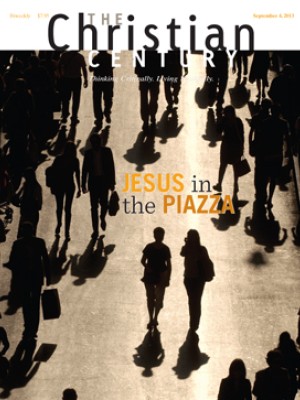The Protestant

The first Protestant I ever met was a silvery gentleman sitting at a table at my uncle’s wedding reception, in New York City, when I was eight years old. This was 1964. I had been the ring bearer at the wedding, and that had been a tense moment during which I clutched the ring so tightly in my palm that my dad, the best man, had to peel my fingers off it one by one as everyone in the church laughed. And then I had been forced by my mother to waltz with one of the demure flower girls at the reception, during which I thought I would die of embarrassment. So I was already rattled when I was introduced, by my dad, to the Protestant.
The Protestant was sitting alone at a table in the far corner of the reception, near the dessert table, and while now I suppose he was sitting alone because everyone else at his table was dancing or standing outside smoking and talking about the Mets, at that time I assumed he was alone because he was Protestant and no one would sit with him, probably because they didn’t speak Protestant.
Read our latest issue or browse back issues.
I had never met a Protestant before, and while I knew they existed, and why they broke away from Our Holy Mother the Church (the Anglicans had to leave because King Henry of England wanted to commit adultery, and the Methodists had to leave because John Wesley made them, and Lutherans had to leave because Martin Luther ruined a church door, and the Presbyterians were Scottish and didn’t like anyone telling them what to do), I had never actually met one, so this was a fraught moment, made all the more so because it was my own dad who led me over to him and, talking as easy and friendly as you would to a regular person, introduced us.
The Protestant stood and gravely extended his hand, and I stood there like a slack-jawed idiot. Then my dad said something quietly witty and he and the Protestant laughed, and then my dad strode off to do best-man things, and I was left alone for a moment with the Protestant.
He sat down and gestured for me to sit down, which I did, terrified, and he said, “Now Brian, your father tells me that your great dream is to be a writer, is that right? An ancient and admirable profession, the scribe, the storyteller, the witness.”
I was speechless; the Protestant had the same wry erudite tone as my dad! Was this some sort of plot, to get me off my guard so he could lure me to Methodism or something?
“I myself am something of a writer,” he continued. “That is how I came to know and admire your father. We are both journalists, you see—your father for the Catholic press and me for Protestant periodicals. On our side we have the utmost respect for your father. I wonder if you know how esteemed he is in his field, in part because he has reached out to journalists in the other Christian traditions in ways no one in his position has ever done, to my knowledge.”
I was still speechless, the very idea of being spoken to reasonably by a Protestant being new to me. But by now I had gotten a good look at the man, and I saw that he was dressed just like a regular person at a wedding reception, except he had not loosened his tie or imbibed heavily, as yet. His hair was combed, his face was evenly and closely shaved, and he had just the same sort of caterpillar eyebrows as my grandfather. To be wholly honest, he looked very much like my grandfather except that he, the Protestant, did not have a pink racing form in his pocket, or a diamond tie pin, or a diamond pinky ring like the one Grandfather said was given to him by Divine Providence one afternoon at Belmont Park race track.
The Protestant did, however, have a slim silver wedding ring on his left hand, and he must have seen me staring at it, for he said, with some amusement, “And are you also married, Brian?”
This was such an unusual question that I was moved to speak, and I said, “No, sir,” and he said, “Although it seems to me that the young lady with whom you danced rather fancied you, perhaps you did not fancy her quite so much as she fancied you,” and I said, “Yes, sir, no, sir,” which still seems to me like one of the most boneheaded things I ever said.
Right about then my dad strode back into view and claimed me for family photographs, but before we left he put both hands on the Protestant’s shoulders and said, “I am deeply touched that you are here, that you made the effort and came all this way. It means a great deal to me. It’s the human moments like this that will bring us all back together as a common force for witness and justice, perhaps. It is only history that divides us, and that’s all in the past. Think what we might do if we all walk together again.”
The Protestant said he too was touched to be invited, and honored, and added, “You can count on me as a partner in the long work, Jim, and maybe the time will come, when Brian is our age, that the walls have crumbled among the Christian traditions, and we are joined in the work we were asked to do by the Founder—and him a Jewish man at that.”
My dad laughed and the Protestant laughed and we parted, but all these years later I remember the way my dad put his hands on that man’s shoulders, and the way they spoke to each other with real affection and respect and camaraderie.
I am older now than they were then and the walls among the Christian traditions have still not crumbled, for any number of silly reasons—mostly having to do with lethargy and money and paranoia—and no sensible man would have the slightest expectation that they will in my lifetime. But sometimes I still wonder what it would be like if they did crumble suddenly somehow, and the two billion Christians on earth stood hand in hand, for the first time ever, insisting on mercy and justice and humility and generosity as the real way of the world. You would think that two billion people insisting on something might actually make that thing happen, wouldn’t you?




